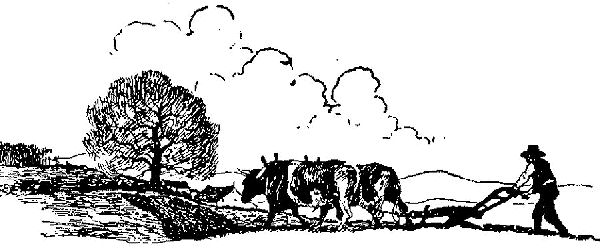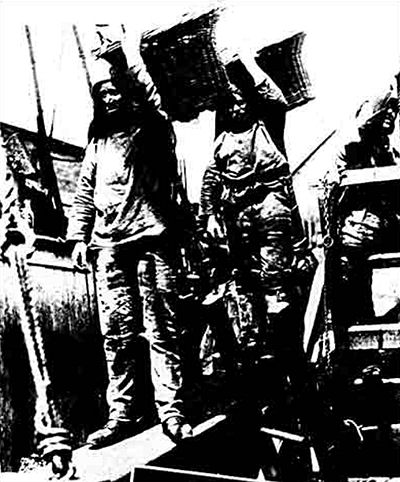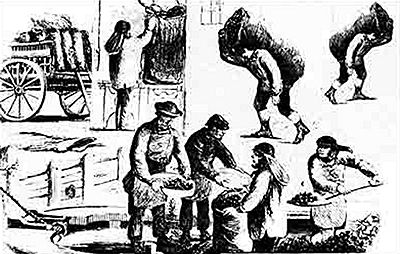1851
This is a very important chapter in the Moore story. They moved
to London as part of the Industrial revolution human exodus of
people from the country to the cities. We know that they had
moved to Lambeth in 1840 as this was when their third child Mary
Moore was born in Lambeth. Their two older children James and
Lucy, were born in Wendover.

Why
did the Moore family leave the clean air of the attractive
country village of Wendover for the polluted crowded city of
London? Although in our modern eyes country living looks
wonderful, by the 1830s many families could not earn enough
money to feed their families. To stay in the country meant
unemployment, poverty and hunger.
After the black death, wages for the agricultural worker had
increased through the laws of supply and demand. Landowners and
tenant farmers need
agricultural labourers to work
their farms. As the population had been devastated those that
survived could ask for more money. The average wage rose to 10
shillings a week. This was still not enough to feed a family.
This income had to be supplemented by being able to exercise
their ‘Common
rights’ which included the right to graze their cattle, sheep,
goats and geese, foraging for pigs, to gather grain left behind
by reapers, picking berries, and gather wood for fuel on the
unfenced ‘common land’.
By
1830 the population of Britain had recovered to pre black death
levels. Soldiers had come back from the Napoleonic Wars looking
for work. With competition for the farming jobs increasing, mill
owners, landlords and tenant farmers gradually reduced the
amount they paid their employees for a weeks work. By 1834 the
average weekly wage had nearly halved to 6 shillings a week.
To make things
worse between 1770 and 1830, the Enclosures Laws changed the
English rural landscape forever. Landowners paid their friends
in parliament to pass local ‘Enclosure’ laws to enable them to
legally annex common land, and
divide it up into
privately owned fields enclosed by hedges and fences.
There were
many advantages for the landowners in enclosing the land. It
helped with the reduction in the spread of disease, because
plots were separated from their neighbours, and livestock were
segregated into herds. Enclosed fields also allowed farmers to
experiment in selective breeding to produce better animals,
which would be more difficult in a common field. Many landowners
would become rich through the enclosure of the commons, heaths
and downland.
The only
restriction placed on the landowners was that they had to pay to construct and maintain the hedging and fences around their
new land. Foreign demand
for English wool also helped encourage increased production, and
enclosure. The
rolling chalk
upland areas of the
Chiltern Hills around
Wendover were ideal sheep
country. The wool industry was often more profitable for
landowners as sheep herding required very few agricultural
labourers. This increased unemployment.
Landless agricultural
labourers
like the Moore family could no longer grow vegetables
grazing their single cow, sheep or pigs on the common land. They
had to pay for wood to light their fires to cook with and keep
them warm in the winter. Families were reduced to starvation
levels. Many families like the Moores,
who had previously been able to live off the land, now were
forced into the cities where they became labourers in the
Industrial Revolution.
 There
are no records to say what was Joel’s first job or that confirm
where about in London they were living between 1840 – 1851. We
do know that in 1851 Joel Moore now aged 33, was working as a
coal porter in central London. Joel had moved in to
26 John Street, Waterloo Road, Lambeth. London SE1. It was an
ideal location as it was within walking distance to the docks of
the south
bank of the river Thames. There
are no records to say what was Joel’s first job or that confirm
where about in London they were living between 1840 – 1851. We
do know that in 1851 Joel Moore now aged 33, was working as a
coal porter in central London. Joel had moved in to
26 John Street, Waterloo Road, Lambeth. London SE1. It was an
ideal location as it was within walking distance to the docks of
the south
bank of the river Thames.
In 1851 the census shows that the
Moore family shared the house with the Howlett family and the
Chapman family who had also previously lived in Wendover. The
head of the Howlett household was Thomas Howlett who was 41 and
the head of the Chapman family was Jonathan Chapman aged 42.
They also worked as coal porters. The coal would have been delivered to London by ships in the
river Thames and the coal porters job would be to carry it off
the ships on to carts and take it to its final destination. There
was no electricity and no gas to provide power and fuel. Coal
was required by factories, shops and and homes for heating,
cooking and driving the steam engines that powered the factory
machines of the Industrial Revolution. It was an essential
commodity that provided the raw energy London needed. In 1848
Waterloo railway Station opened. The original main entrance of
the station was a few yards from the end of John Street. Thomas,
Jonathan and Joel would have also worked together providing the
railway steam engines with enough coal to pull their freight and
passenger coaches down to the South Coast ports.
In 1851 James Moore was now
13. He was the last Moore to be born in Wendover. James now had
five brothers and sisters who were all born in Lambeth, London.
Mary Moore was 11, Joel (junior) was 5, Sarah was 3, William was
2 and baby Mary was 1 month old. Martha Moore, Joel (senior’s) mother, is
not shown on the 1851 census records in Wendover. She probably
passed away between 1841 and 1851.

CLICK
HERE to see the 1851 census record page one
CLICK
HERE to see the 1851 census record page two |

